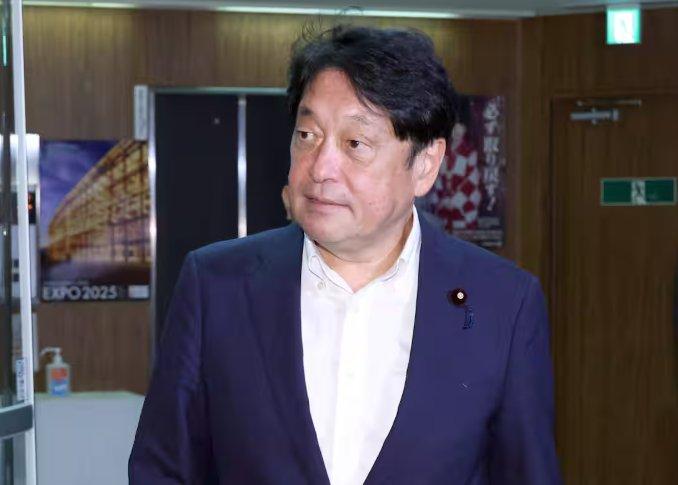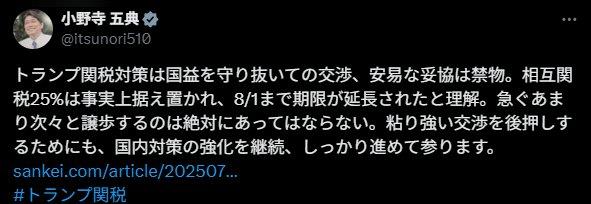

According to a report by Japan’s “Asahi Shimbun,” following President Donald Trump’s announcement of a 25% tariff on all imported Japanese products, the Liberal Democratic Party (LDP) convened a meeting for its comprehensive countermeasures department on July 8th local time.
During the meeting, Kozo Yamamoto, the chairman of the LDP’s Policy Research Council and a member of the House of Representatives, issued a stern statement regarding the new tariff measures announced by the United States.
“We are deeply outraged; this is not acceptable,” Yamamoto stated while strongly protesting against the US, “This proves that the Japanese government will not back down in defending its national interests and insists on engaging in resilient negotiations.” He expressed his intention to continue pushing forward with the negotiation process.
At the same time, Yamamoto criticized Trump’s act of sending a tariff letter to Japan.
“Sending a letter to an ally is extremely disrespectful,” Yamamoto demanded of the Japanese government, “We must never compromise easily due to haste in negotiations, but must persist in our stand.”
Regarding domestic measures, Yamamoto emphasized “supporting industries hit by the impact through measures such as stimulating domestic demand,” stating “We will firmly protect our own industries, employment, and people’s livelihoods, fully support the government’s negotiations, and refine domestic policies.” He specifically mentioned: “Japan must establish a robust economic structure that is not affected by external policy changes, building an economic system capable of resisting risks.”
On the same day, Yamamoto shared reports from Japanese media about his statement on X platform. He also wrote: “This is a negotiation for protecting national interests, we cannot easily compromise… We must not rush into continuous concessions. To support ongoing negotiations, we will continue to strengthen domestic policies effectively.”
Kozo Yamamoto, Chairman of the Policy Research Council of the LDP, reported by Japanese media.
With the upcoming Senate election on July 20th, whether the ruling coalition formed by the LDP and the Public Ministries Party can maintain its majority seats becomes a key question.
In the Japanese Dietary Election held in October last year, the ruling coalition’s seats fell short of half, becoming a minority in power.
A recent public opinion poll conducted by Kyodo News from July 5th to 6th showed that the opposition camp was more popular than the ruling coalition, with nearly half (49.9%) of respondents hoping that the ruling coalition would not achieve its goal of reaching a majority of seats. The poll also revealed that the cabinet led by Shigeru Ishiba had fallen to 25.4%, a decrease of 7 percentage points from the previous survey.
According to reports, after the meeting on the 8th, when asked about the impact of the election, Koichi Noda stated: “This has nothing to do with the election. Tariff issues will have a significant impact on people’s lives. It concerns national interests, and I hope the government can resolutely respond.”
On July 7th local time, President Trump announced new tariff rates for multiple countries one by one, imposing 25% tariffs on Japan and South Korea. The tariff rate on South Korea remained consistent with the announcement made at the beginning of April, while the tariff rate on Japan increased by one percentage point. Trump also signed an executive order extending the effective date of so-called “countervailing tariffs” until August 1st, rather than the originally scheduled July 9th.
That day, Trump began sending letters to trade partners who were yet to reach a tariff agreement. So far, 14 countries have received notices from Trump. Foreign media generally interpret this as Trump’s latest move to pressure Japan and South Korea further, as well as to show other countries what he is doing. These letters on the one hand hint at negotiation room, and on the other hand, they warn that if retaliatory actions are taken, the United States will “double down on countervailing measures.”
“Please understand that a 25% tariff is far below the level needed to eliminate our trade deficit with your country,” Trump warned Japan and South Korea in the released letters. “If you decide to raise your tariffs, then no matter how much you increase them, they will be added onto our 25% tariff rate.”
According to a report by the Tokyo Broadcasting Company in Japan, on the 8th, the Japanese government convened a headquarters meeting on comprehensive countermeasures against U.S. tariff measures to discuss response strategies.
Shigeru Ishiba responded at the meeting, stating: “We are deeply disappointed by the announcement of the imposition of tariffs by the United States… The Japanese government did not easily compromise during difficult negotiations and expressed its legitimate demands, safeguarding what should be protected.” He also mentioned that the effective date for the tariffs is August 1st, which signifies an extension of the negotiation period and will continue to engage in discussions with the United States.